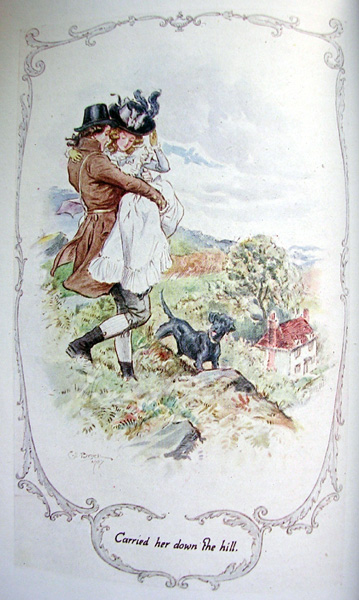Cents and Vulga SistersSensibility
Rereading
Illustration by C. E. Brock, 1908, via Wikimedia Commons. Public domain.
Single women have a dreadful propensity for being poor …
If I am a wild beast, I cannot help it. It is not my own fault.
—Jane Austen, from The Letters of Jane Austen
How does a woman writer make her own money? How does she find the time to write? As a young woman, I scoured every book-jacket biography trying to decipher this secret.
My mother, a Depression baby, gave me sound advice: “Make sure you earn your own money. Especiallyif you’re married, do you hear me?” I did indeed. Once you’ve been poor, you’re forever hounded by the fear you’ll be poor again.
Jane Austen lived in a time when ladies of her genteel class had few options to acquire wealth, much less manage it themselves. If lucky, she might inherit a legacy like her brother Edward, adopted by wealthy cousins seeking an heir. She could marry money, possibly. Or she might seek a position in a prosperous household as a governess. Charlotte Bronte’s Jane Eyre,published a generation later, would document why the governess route was unthinkable.
What was an educated woman with no dowry to do? Take up sewing? We know Jane Austen was gifted with the needle from what her nephew tells us in his memoir and from what she herself admits in her letters. All well and fine to make shirts for your father, brothers, or the poor, but to practice any handicraft for income was considered vulgar for a woman of her class. Jane was the daughter of a vicar. With neither land nor money, theirs was the bottom rung on the gentry ladder.
In Sense and Sensibilityand throughout Jane Austen’s oeuvre, we witness a recurring theme, the dilemma yet again of women without property. The first few chapters of Sense and Sensibility are all about money, and money is mentioned throughout the novel. Who has it. Who doesn’t have it. How much someone is worth. How much someone needs to keep up appearances and not slip into penury.
From Sense and Sensibility’sopening paragraph, we are introduced to an unmarried man of wealth whose household is managed by—a spinster sister. It’s the death of this sister that sets off a series of events that plummet the Dashwood women into poverty. Their loss is exemplified by their eviction from a grand mansion, Norland, to dumpy, frumpy Barton Cottage.
Life imitates art. Jane, her sister Cassandra, and their mother found themselves in financial straits with the death of the family patriarch, just like the characters in her novel, a story she had started a decade earlier. But what if your several brothers don’t invite you to manage their household? What if they desire you only to serve as a live-in babysitter for their eleven kids? What if it never occurs to them that you might need a quiet space of your own? Kin can be complacently myopic. With no one coming to their rescue for some time, Jane Austen undoubtedly had to think of a way to find work. Real work. Not the “work” of the ladies of her class with the needle, but with something sharper. Her pen.
For years, the trio of Austen women wobbled in temporary lodgings, living as frugally as they could manage, sometimes inviting a destitute spinster to join them, until finally Jane’s affluent brother woke from his torpor and offered them lodging at a laborer’s cottage he owned in Chawton. He also had a mansion in the same Hampshire neighborhood, not to mention a manor house in Kent to rival Norland. Why he didn’t offer his own mother the big Hampshire house is beyond me. Maybe like the characters in Sense and Sensibilityhe thought, “Their housekeeping will be nothing at all. They will have no carriage, no horses, and hardly any servants.” And just as in her novel, visitors to their humble abode were of the opinion it was charming, totally suitable for a widow and daughters, not comprehending that the word cottageis simply, in the optimistic vocabulary of realtors, a hovel.
I once lived, as a girl, in what was termed a bungalow, and I can say with authority it is nothing more than a house with not enough bedrooms nor bathrooms for its inhabitants. We packed ourselves in our three-bedroom home like the old lady who lived in a shoe, with nine people having to make do. Barton Cottage, with its four bedrooms and a garret, sounded luxurious to me.
Bungalows, like cottages, are damp with condensation and cold in the winter, and a multitude of invading pests: flies, cockroaches, mice. Add several men at home, and it’s as noisy as a zoo. Jane Austen records one brother’s unforgettable visit by his habit of banging doors and ringing the servant for water at all hours. But at least they had doors! And servants.
Add to all this the upkeep of a country cottage. In Sense and Sensibility, a visitor remarks on the dirty country roads around Barton Cottage. This means mud brought indoors during rain. With no indoor plumbing, someone had to haul buckets from an outdoor pump, not easy work in summer and total hardship in winter. And I haven’t mentioned the labor required to heat this drafty basket.
The Dashwood sisters no doubt were raised with servants lighting their bedroom fireplaces before they rose out of bed. Their reduced circumstances allowed them to keep only three employees; imagine what the three employees had to say about their added duties. To make matters even worse, the family’s economic descent happened just when Elinor and Marianne were at that crucial age of shopping for husbands. Fashion added to their anxieties with flimsy dresses made of lightweight muslin, the very worst fabric to wear when you’re on your period.
And what, I wonder, was the standard euphemism of the time when nature called? Jane Austen is too much of a lady to satisfy my coarse curiosity, so I have done my research. In one of their temporary lodgings in Bath, the Austens rented a house with an earth toilet in the garden. I learned this reading Lucy Worsley’s excellent Jane Austen at Home, where she also mentions their mahogany convenient stools; “seat-less stools for placing over a chamber-pot.” I suppose that was why social visits then were not more than a quarter of an hour. In an emergency you could claim a nervous headache as Elinor does for her sister when the Sharpe sisters threaten to descend.
Sense and Sensibilitywas an unfinished manuscript rescued from Jane Austen’s work basket. Her first version, drafted in 1795, was told in a series of letters, like the novels popular in the eighteenth century. But during the next ten years, she unstitched and resewed, designing a new garment from the old, perhaps emboldened by economic necessity after her father’s death. At long last, when she felt satisfied with her handiwork, she sent it to a publisher. It was accepted and presented to the public in 1811, eventually earning Jane a small profit. Even more important, its success inspired her publisher to take a chance and accept her next novel, Pride and Prejudice. Jane Austen was thirty-five years old, finally earning a little money. From her pen! And I can tell you, that’s a feeling that makes up for life’s exploding cigars.
With the publication of Sense and Sensibility, Jane could claim her right to write. I wonder if she missed the tranquility of the vicarage countryside of her youth. Chawton Cottage, unlike Barton Cottage, sat directly upon a main road with stagecoaches rattling and rumbling past causing the whole house to shake. I know what that’s like. The last house I lived in with my parents was next to a commuter train station. During rush hour, our house shivered like a Mexican earthquake. You got used to it. But that doesn’t mean you liked it.
What was privacy in Jane Austen’s time? Jane slept all her life in the same room as her sister, sometimes in the same bed. I shared a bed with little brothers as a child and with my mother as an adult. This was normal to our family as it was no doubt normal to Jane’s. Living alone or living with a circus, a writer searches for a house of her own, sometimes finding it inside herself.
The move to Chawton, near family, must have been both a blessing and a curse, I suspect. Jane may have channeled her complaints when she wrote: “Little had Mrs. Dashwood or her daughters imagined … that they should have such frequent invitations and such constant visitors as to leave them little leisure for serious employment.”
I don’t believe the official version of Jane Austen’s life as told by her brothers and their offspring. I’m not convinced Jane politely hid her writing when they stomped in and joyously entertained them while mother hogged the sofa. I think the Austens painted a pretty pastel memory of Chawton Cottage to relieve themselves of their guilt. Where were they when the widowed matriarch of the family and spinster aunts wandered about homeless searching for cheap lodgings? No wonder Jane Austen wrote about displaced women so sympathetically in Sense and Sensibilityand in the novels that followed.
All the same, Jane Austen’s move to a permanent address, however bustling, was enough to allow her the liberty to return to her pen. A writer needs long stretches of runway for her imagination to gather speed and attempt magnificent leaps. And to do this she needs no interruptions. What every woman writer needs is to feel safe and secure enough to play.
What were Jane Austen’s fears? Just like the women in her stories, money was forever a big issue. Even when her father was alive. She would always have to consider living with her mother and her sister. Cassandra vowed, when her fiancé died, never to marry. Marriage could be risky; two Austen sisters-in-law died in childbirth. Added to this, Jane must have known if she married, there would go her brilliant career. After all, she did say yes to one suitor, and the next morning changed her mind.
There might also have been another fear for Jane the writer in her third decade, the fear of mortality, the fear of not finishing her work in her lifetime. Turning thirty is a big wake-up call for a woman writer. It’s when she reviews her life and asks, What have I got to show for myself? It’s when she finally quits trying to please everyone and starts pleasing herself.
The only other person whom Jane could confide in with the frankness of her pen was her beloved Cassandra. On paper, as with her sister, she could speak her thoughts uncensored, however scandalous. She could laugh. And laughing is a form of triumph.
I believe that writing empowered Jane to reimagine the world in a way that allowed her as a woman to defeat life, this at a time when women could not win. Writing was her “otro modo de ser,”another way to be, as the writer Rosario Castellanos so accurately put it. Sense and Sensibilityushered Jane Austen into a safer and more secure world than the Regency England of her time.
Every woman writer could use a room of her own, as Virginia Woolf wrote. But what really serves a woman, in my opinion, is a house. One she doesn’t have to share. One she doesn’t feel obliged to serve. A house that serves her.
To do battle for women like the Dashwoods, the Bennetts, the Miss Bates, the Fanny Prices of society, Jane’s victory was inhabiting the house of the imagination. I understand this. A great din is banging in my heart as I write today; the roundup of undocumented immigrants in the U.S., the disregard for the planet’s well-being, the loss of women’s rights and civil liberties, especially freedom of speech. To address the injustices of my times, I am, like Jane, trying to inhabit my imagination.
A woman writer needs money, she needs quiet, she needs solitude, the liberty to ignore the intolerable noise of company to better attend the society inside her head. She needs to give herself permission to run about with her hair uncombed, to wander all day in pajamas, to ignore the unmade bed, the dishes in the sink, the unanswered emails, the annoying, buzzing phone. She needs the luxury to think of her own needs because since birth she has been trained to deny she has any. She needs to become Coatlicue, the Aztec goddess of creation and destruction, a monster so terrible the conquistadores were forced to rebury her after they had unearthed her.
A woman writer needs to feel no guilt about transmogrifying into Coatlicue. Above all else, to save herself from self-destruction, a woman writer needs to write.
This essay is adapted from the introduction to a new edition of Sense and Sensibility, to be published by Vintage Books in July.
Sandra Cisneros is is a poet, novelist, essayist, performer, and artist. She is the author of The House on Mango Street, Woman Hollering Creek and Other Stories, and A House of My Own,among other titles.









